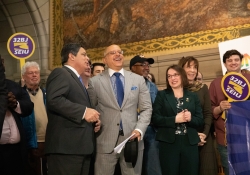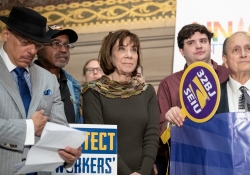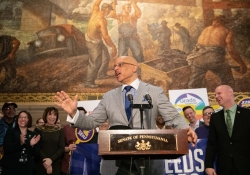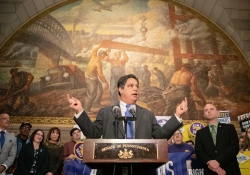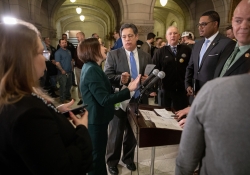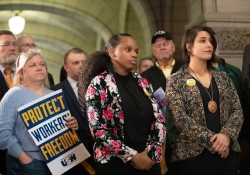HARRISBURG, PA, 26 de marzo de 2019 - Los demócratas de la Cámara de Representantes y el Senado de Pensilvania presentaron hoy un paquete de legislación destinado a frenar el acoso en el lugar de trabajo, junto con el apoyo del gobernador Tom Wolf y la defensora de las víctimas Jennifer Storm.
"Como grupo, hemos trabajado con las partes interesadas y los defensores y nuestros propios empleados para elaborar un paquete de legislación que creemos que puede frenar el acoso sexual y hacer más para proteger a sus víctimas", dijo el líder demócrata del Senado Jay Costa, Jr. "Cada uno de nuestros proyectos de ley en este paquete tiene como objetivo ampliar las protecciones a las personas, independientemente del tamaño o tipo de su empleo, porque el tiempo se acaba en el acoso laboral."
"El acoso sexual y la discriminación en el lugar de trabajo no empezaron de la noche a la mañana, por lo que llevará algún tiempo corregirlos adecuadamente", dijo el gobernador Wolf. "No es tan fácil como meter en la cárcel a unos cuantos personajes de renombre. Tenemos que identificar los comportamientos cotidianos y corregirlos si queremos que Pensilvania sea un gran lugar para vivir y trabajar. La gente no puede hacer su mejor trabajo cuando se siente incómoda. Merecen ser tratados de una manera que cumpla las normas básicas que representan cómo queremos que actúen todos los trabajadores de Pensilvania, y deben ser tratados con el respeto y la dignidad que merecen todos los trabajadores de Pensilvania. Por eso abogo por una legislación que impida el acoso sexual y la discriminación en el lugar de trabajo, tanto en el sector público como en el privado."
Los proyectos de ley se presentarán de forma idéntica en cada cámara. Hacen lo siguiente
- Amparar a los contratistas y becarios no remunerados bajo la protección de la Ley de Relaciones Humanas
- Modificar la Ley de Relaciones Humanas para exigir a los empresarios que proporcionen formación a los empleados y que los anuncios normalizados sobre prácticas leales incluyan específicamente ejemplos de acoso y discriminación.
- Exigir formación sobre acoso sexual a los grupos de presión
- Ampliar la Ley de Relaciones Humanas para incluir a los trabajadores domésticos
- Derecho a juicio con jurado, indemnizaciones punitivas y ampliación del plazo de prescripción en virtud de la Ley de denuncia de irregularidades.
- Ampliar la Ley de Relaciones Humanas para incluir la cobertura de cuatro empleados a un empleado, añadir el derecho a un juicio con jurado, daños punitivos, honorarios de abogados y ampliar el plazo de prescripción.
- Exigir a los empresarios que adopten políticas escritas contra el acoso en el lugar de trabajo y procedimientos de denuncia.
- Añadir la orientación sexual y la expresión o identidad de género a la lista de clasificaciones protegidas por la Ley de Relaciones Humanas de Pa. Ley de Relaciones Humanas
"Durante años, el acoso en el lugar de trabajo ha sido un problema generalizado en los campos de carrera en toda Pensilvania y esta nación. Tenemos que aprovechar el impulso y la fuerza del movimiento #MeToo y revertir años de discriminación en el lugar de trabajo", dijo el senador Larry Farnese. "Nadie, independientemente de su género, raza u orientación sexual, debe ser presionado o sufrir el peso del acoso laboral".
"Tenemos que dejar claro que no hay lugar para ninguna forma de acoso y que tampoco habrá tolerancia", ha declarado el senador Wayne D. Fontana. "Con este paquete legislativo, estamos dando pasos definitivos que a la vez envían un mensaje fuerte y lo respaldan con cambios sustanciales sobre cómo se puede prevenir el acoso, cómo se debe manejar y cómo se debe tratar a las víctimas."
"Proteger a los denunciantes del acoso y la discriminación en el lugar de trabajo es una pequeña parte de la solución para cambiar nuestra cultura", dijo el senador Haywood. "Vuelvo a presentar esta legislación sabiendo que nos queda mucho camino por recorrer".
"En el clima empresarial actual, en el que los empresarios recurren a menudo a contratistas independientes y becarios no remunerados para cubrir sus necesidades de personal, la legislación de Pensilvania debe tener en cuenta y proteger a todas las categorías de trabajadores. Todo el mundo tiene derecho a un lugar de trabajo libre de acoso y discriminación", declaró el senador Tartaglione.
Para más información, visite PaSenate.com/harassment
###
Pittsburgh, Pa. - 14 de marzo de 2019 - Los senadores Lindsey M. Williams, Jay Costa y Vincent J. Hughes, junto con funcionarios electos locales, miembros del Consejo Laboral del Condado de Allegheny y una multitud de trabajadores sindicalizados, anunciaron la presentación de la Ley de Libertad en el Lugar de Trabajo hoy en el Palacio de Justicia del Condado de Allegheny.
La Ley de Libertad Sindical protege a los trabajadores de Pensilvania reforzando la negociación colectiva de dos maneras. En primer lugar, elimina el requisito de un proceso electoral de dos niveles al permitir una simple comprobación de tarjetas en la que bastaría con expresar el apoyo mayoritario. En segundo lugar, exige el acceso a los sindicatos certificados a los nuevos empleados, de modo que puedan explicarse claramente las ventajas de la afiliación sindical.
"Me emociono mucho cuando alguien dice: 'No soy antisindical. Me encantan los gremios de la construcción. Simplemente no me gustan los sindicatos del sector público'", dijo la senadora Williams. "Pero no es así como funciona estar a favor de los sindicatos. En primer lugar, un perjuicio para uno es un perjuicio para todos. En segundo lugar, la afirmación de que 'no me gustan los sindicatos del sector público' desprecia enormemente la amplia variedad de trabajadores del sector público representados por sindicatos, incluidos nuestros bomberos, operadores del 911, agentes de policía, funcionarios de la Comisión de Pesca y Embarcaciones, e incluso empleados de obras públicas, electricistas y carpinteros en agencias gubernamentales de toda la Commonwealth."
"Los sindicatos han ayudado durante mucho tiempo a los trabajadores a ganar mejores salarios, atención médica, seguridad y beneficios de jubilación, por lo que queremos garantizar que los sindicatos puedan seguir trabajando para los futuros miembros", dijo el senador Hughes. "Los trabajadores de Pensilvania han visto sus mayores ganancias a través del poder de negociación de los sindicatos y no tolerarán una mayor erosión de estas instituciones críticas que ponen los beneficios de los trabajadores en primer lugar."
"Es hora de que los funcionarios electos adopten una postura", dijo el senador Costa. "Las familias trabajadoras necesitan líderes electos para hacer frente a los ataques contra los derechos sindicales, y en su lugar crear más oportunidades para los residentes de Pensilvania a tener la libertad de unirse y formar sindicatos. Es por eso que estoy firmando el PA Workforce Freedom Act".
El representante Dan Miller también habló en la conferencia de prensa, así como los miembros de SEIU Caitlin Schroering, Comité Organizador de Estudiantes Graduados de Pitt y candidata al cuarto año de doctorado; Nick Theis, Comité Organizador de Trabajadores de UPMC e Investigador Médico en UPMC; Pam Johnston, Miembro de la Junta Ejecutiva de SEIU 32BJ y limpiadora de edificios en la Universidad de Pittsburgh; y Wanda Smith, Presidenta del Capítulo SEIU 668 y supervisora en la Oficina de Asistencia del Condado de Allegheny.
###
Clairton, Febrero 7, 2019 – With an overflow crowd of steel workers and concerned citizens in attendance at Clairton City Hall, a joint state Senate-House Democratic Policy Committee hearing was held today on ways to improve air quality, community notification procedures and emergency response.
The hearing was held in Clairton at the request of state Senator Jim Brewster (D-Allegheny/Westmoreland) and Representative Austin Davis (D-Allegheny). It was prompted by a Diciembre 24, 2018, fire at the Clairton Coke Works that resulted in emissions of high levels of sulfur dioxide and damage to the facility’s gas processing system.
“We need to see to it that air quality standards are properly monitored, and that local emergency response and community notification procedures are accurate and timely,” Brewster said. “To accomplish this goal, we must bring together officials from U.S. Steel, the Allegheny County Department of Health, local governments, labor organizations and emergency responders. We need to both address air quality issues and protect good paying jobs in the industry.”
Davis added, “Improving the air quality in our communities is my top priority. I appreciate the testimony of all stakeholders. As we look to improve air quality it’s imperative that we look for effective ways to do so.”
The hearing was jointly chaired by state Sen. Lisa Boscola (D-Northampton/Lehigh) and state Rep. Mike Sturla (D-Lancaster).
“Being raised in the shadow of the Bethlehem Steel plant, I am well aware of the seriousness of air quality issues and how communities such as Clairton must balance an economic reliance on good industrial jobs against health and environmental issues,” Boscola said.
Sturla added, “I thank Representative Davis for bringing this important issue to the House Democratic Policy Committee’s attention. This joint public hearing helps ensure that all perspectives are heard as the legislature looks for effective ways to improve air quality.”
Claiming that U.S Steel is committed to keeping the coke works operational and doing more to improve its environmental efforts, Chris Masciantonio, who serves as Director of Government Affairs & Public Policy for U.S. Steel, said, “The Mon Valley community is more than just the company’s home; it’s our company’s birthplace and where our employees work and live. The safety of our employees, our partnering contractors and our neighboring communities is paramount to our efforts.”
Masciantonio argued that placing the plant on hot idle, as some environmentalists have urged, would be a lengthy, difficult and costly process.
Don Furko, who serves as president of the United Steelworkers Local #1557, added, “Simply put, if U.S. Steel ends up idling batteries, our members will lose their jobs. This will begin a chain of events that will have a devastating impact on them, their families and our communities across the Mon Valley.”
Members of environmental organizations and Dr. Deborah Gentile of Pittsburgh testified that residents of the Mon Valley have been exposed to pollutants for decades. They said the pollution level and related health threats were compounded by the recent fire and emission exceedance.
Some of the environmentalists called for greater U.S. Steel efforts to comply with health and safety dictates and reduce pollution discharges. They also called on the Allegheny County Department of Health to step up monitoring, enforcement vigilance and provide more responsive public notification when problems arise.
Dr. Karen Hacker, director of the county health department, said the department has already ramped up its enforcement efforts. She said her agency has imposed direct enforcement orders and civil penalties. She said the department’s expanded legal team has also stepped up inspections, toughened penalties and collaborated with state and federal environmental enforcement agencies.
“The department will continue to be proactive and aggressive to improve air quality in our county, as our actions indicate,” she said. “We will continue to improve our communication via our current strategies through additional opportunities such as mobile phone applications and direct communication with citizens, municipal leaders and legislators.”
The hearing follows a Enero 22 public meeting in Clairton. Brewster, Davis and Senate Democratic Leader Jay Costa (D-Allegheny) and Rep. Bill Kortz (D-Allegheny) and Austin Davis (D-Allegheny) were also updated on Enero 25 by officials from the Allegheny County Health Department.
Joining Brewster, Boscola and Costa at today’s hearing were Senators Wayne Fontana (D-Allegheny) and Lindsey Williams (D-Allegheny). In addition to Davis, Sturla and Kortz, Representatives Summer Lee, Ed Gainey, Dan Miller, Brandon Markosek and Sara Innamorato (all D-Allegheny) attended.
Those who testified included:
Panel from U.S. Steel Corporation:
- Chris Masciantonio, Director of Government Affairs & Public Policy
- Mike Rhoades, Plant Manager, Clairton Coke Works
- Tishie Woodwell, General Manager, Environmental Affairs
- Kurt Barshick, General Manager, Mon Valley Works
- Jim Futrell, Vice President of Market Research and Analysis, Allegheny Conference on Community Development
Panel from Allegheny County Health Department:
- Dr. Karen Hacker, Director
- Jim Kelly, Deputy Director for Environmental Health
- Michael Parker, Solicitor
- Dr. LuAnn Brink, Chief Epidemiologist
Panel from area unions:
- Don Furko, President, United Steel Workers Local 1557
- Jeff Nobers, Executive Director, Builders Guild of Western Pennsylvania
- Ken Broadbent, Business Manager, Steamfitters Local Union 449
Panel of health and environmental advocates:
- Dr. Deborah Gentile, Physician, Pediatric Alliance
- Rachel Filippini, Executive Director, Group Against Smog & Pollution
- Matt Mehalik, Executive Director, Breathe Project
- Ashleigh Deemer, Western Pennsylvania Director, PennEnvironment
# # #
Pittsburgh, Pa. − Febrero 6, 2019 − Senate Democratic Leader Jay Costa, Jr. today circulated a memo seeking cosponsors for legislation that would require UPMC and Highmark to either contract with each other for services or enter mandatory arbitration if they fail to come to an agreement on their own.
The bill addresses the issue of integrated delivery networks throughout the Commonwealth; however, this issue is particularly problematic in southwestern Pennsylvania given the ongoing dispute between UPMC and Highmark. While the two are currently operating under a consent decree, that order will expire in Junio of this year.
Under existing law, there is no mechanism to resolve contract disputes between large integrated delivery networks, like UPMC, Allegheny Health Network, and Geisinger, which could threaten patient access and choice. Under Senator Costa’s legislation, if networks fail to come to an agreement on their own, they would be compelled to enter mandatory arbitration to settle the dispute.
“Both parties need to come to the table, negotiate and cultivate a relationship that will allow the residents of Western Pennsylvania to get the care they need. It’s time to undo the damage caused by the divorce of these two companies. Disputes between enormous, profitable companies cannot get in the way of patients and their care,” said Senator Costa. “Health care consumers should not have to worry about whether their insurance will be accepted when they’re sick, injured or simply seeking preventive care. Their only worry should be getting healthy. This legislation can relieve that stress and establish consistency for integrated delivery networks.”
There are strong consumer protection and public policy reasons for adopting this legislation.
First, by requiring hospitals and physicians operating as part of an integrated delivery network to contract with all insurers, consumers will not be denied care, or worse abandoned mid-treatment, simply because they hold one type of insurance over another. All consumers should be afforded access to these vital hospital and physician services, regardless of which insurance card they carry.
Second, the legislation will also eliminate the ability of any dominant hospital system from demanding unreasonable rates for services from insurers, and in turn raising the overall cost of health care because they are the “must have” system in the area.
For more information on the legislation, read the full cosponsorship memo and follow its progress here.
PITTSBURGH, Febrero 1, 2019 – State Senate Democratic Leader Jay Costa and Sen. Wayne D. Fontana today jointly announced a $650,000 state grant to provide open space and transportation improvements to the 28-acre former Civic Arena site in Pittsburgh.
“I am pleased that these state dollars will help advance this effort to beautify and improve access in that section of the city,” Costa said. “I will continue to work with Senator Fontana and local officials to make Pittsburgh even more accommodating and attractive to residents and visitors.”
Fontana added, “The arena is a linchpin that will continue to attract both business and residential investment in the lower Hill District portion of our city. This state support will help advance and enhance the city’s redevelopment efforts.”
The $650,000 in state Multimodal Transportation funds will be awarded to the Sports and Exhibition Authority of Pittsburgh and Allegheny County for a new three-acre public open space that will provide improvements to intersections, the streetscape, provide new pedestrian pathways, bicycle routes, a bus stop, bikeshare station, and upgrade stormwater management, energy-efficient lighting, and other public amenities. The development work will take place on the so-called “cap” over I-579 that connects the 28-acre former Civic Arena site to downtown.
The multimodal funds (Act 89 of 2013), administered by PennDOT, support ports and rail freight, increase aviation investments, establish dedicated funding for bicycle and pedestrian improvements and allow targeted funding for priority investments in any mode. The grants are aimed at improving efficiency, safety and transportation mobility.
# # #
Penn Hills, Pa. – Febrero 1, 2019 – Today, Senator Jay Costa and Representative Tony DeLuca announced $3 million in state funds for a roadway project in Penn Hills Township.
The grant comes from the Multimodal Fund and will be used to repave and improve roadways throughout the township most in need of repair, complete ADA-compliant cut-outs and sidewalks, and make streets more accessible for bicycle traffic.
“Livable, walkable communities are one of the reasons that folks move to our area and this grant will make huge improvements in accessibility for Penn Hills,” said Senator Costa. “I look forward to seeing this project through, and opening up our roadways for pedestrians and cyclists to commute safely.”
“When one thinks of improving infrastructure, one tends to think of building a new road or fixing a bridge, but repaving roads and making them and sidewalks more pedestrian- and cyclist-friendly is all part of building better infrastructure, which is key in making one’s community a safer place to live for everyone,” DeLuca said. “This grant is welcome news.”
The Multimodal Transportation Fund provides grants to encourage economic development and ensure that a safe and reliable system of transportation is available to the residents of the commonwealth.
Funds may be used for the development, rehabilitation and enhancement of transportation assets to existing communities, streetscape, lighting, sidewalk enhancement, pedestrian safety, connectivity of transportation assets and transit-oriented development.

